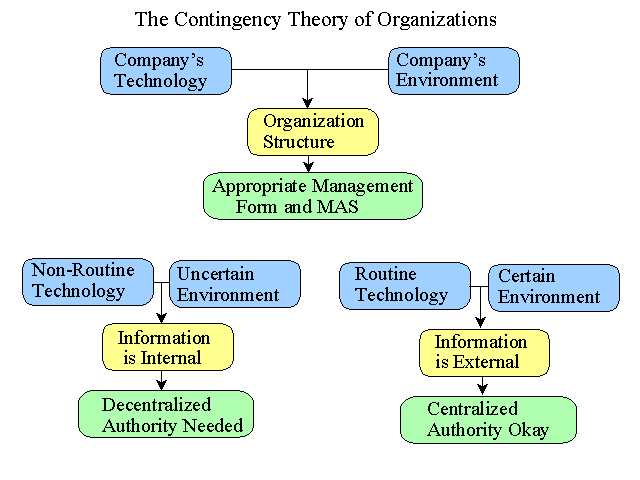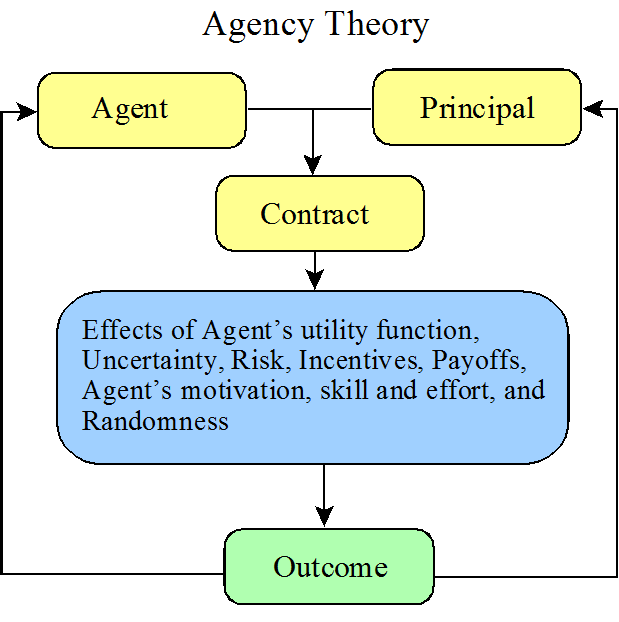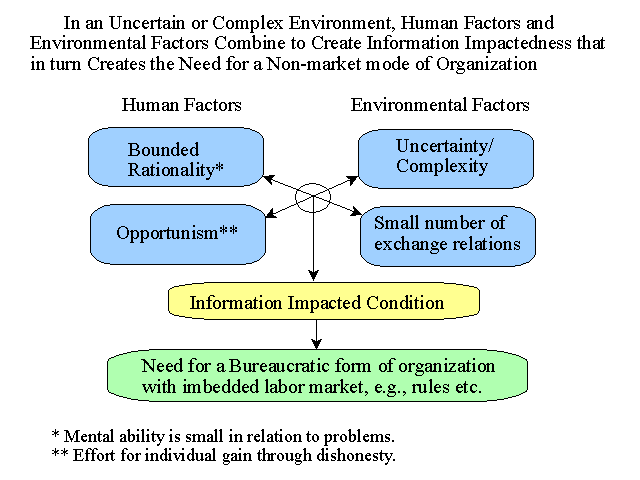
Summary by James R. Martin, Ph.D., CMA
Professor Emeritus, University of South Florida
Agency Theory Main Page | Contingency
Theory Main Page | Theories Main Page
Contingency theory provides an approach to developing a descriptive theory of management accounting systems (MAS) based on the idea that the effectiveness of a management accounting system is contingent on an organization's structure. But, according to Tiessen and Waterhouse, a more elaborate theory can be developed drawing on agency theory and the theory referred to as the markets and hierarchies framework. The purpose of this article is to provide a more elaborate view of contingency theory by including these additional concepts and to indicate the implications of this view for management accounting systems. In addition the authors attempt to explain why companies continue to use responsibility accounting in spite of the frequently cited dysfunctional behavior associated with responsibility accounting systems.
The theme of the paper is that management accounting measurements, organizational, behavioral and economic factors combine and interact to create desirable organizational effects. The article includes five sections as follows:
1. Contingency theory.
2. Agency theory.
3. Markets and hierarchies.
4. MAS implications.
5. Summary and conclusions.
Contingency Theory
One popular view of contingency theory is that the structure of an organization depends on the company's technology and environment, and that the effectiveness of managerial processes (including the management accounting system), is contingent on the organization's structure.
The location of information in relation to technology and environment has an important influence on organization structure. In uncertain environments with non-routine technology, information is frequently internal. Where environments are certain, or where technology is routine, information is external.
The dimensions of structure and control include authority structure and activities structure, i.e., rules and procedures that determine the discretion of individuals. Authority relates to social power. In the contingency model, decentralized authority is more appropriate where uncertain environments or non-routine technology exist. Centralized authority is more appropriate when environments are certain. The graphic below reflects my interpretation of these theoretical concepts.

Although the contingency theory explanation of the relationships between organization structure, environment and technology seems reasonable, the model does not explain the many similarities in management accounting systems across organizations, or the stability of these systems. This observation supports the need for an elaborated model.
Agency theory is developed around the concept of contractual relationships between two groups with conflicting objectives, i.e., principles and agents. The objective in agency theory is to structure the contractual relationship between these groups so that agents take actions to maximize the welfare of principals. The problems related to accomplishing this objective include the following:
1. the agent's utility function is based on the utility for wealth and the disutility for effort, while the principal's utility
function is only based on wealth.
2. the effects of both ex ante and ex post uncertainty,
3. the effects of risk where the principal is assumed to be risk neutral and the agent is assumed to be risk averse.
4. the effects of incentives and payoffs,
5. the moral hazard problem - not knowing the effects of the agent's effort vs. randomness,
6. the adverse selection problem - not being able to determine the agent's skill level.
The following graphic shows my interpretation of the main ideas in this section.

The authors discuss several cases, or situations related to these issues, as well as some limitations of agency theory but indicate their belief that agency theory provides insights related to the structure of organizations and the role of accounting in maintaining this structure. For example, contracts between principals and agents show which actions are observed and reported, and how information is used to determine shares of risk and payoffs. Thus, proposed changes in accounting methods that fail to consider contracts between principals and agents, along with the various issues addressed in agency theory, may receive considerable resistance.
Markets and Hierarchies
According to Tiessen and Waterhouse, the markets and hierarchies framework is referred to as the "organizational failures framework" and emphasizes information, structure and control. Hierarchies replace markets in determining relationships between those engaged in transactions when the costs associated with contracts become too high. This theory or framework goes beyond agency theory where all transactions are assumed to be governed by contracts.
(A review of Ouchi's three control mechanisms, i.e., market, bureaucracy and clan, might be useful to the reader at this point since the term "hierarchies" as used by Tiessen & Waterhouse appears to have essentially the same meaning as the term "bureaucracy" as used by Ouchi).
Non-market modes or organization, i.e., hierarchies (Ouchi's bureaucratic form) provide a comparative advantage over markets in an uncertain or complex environment because together with bounded rationality and opportunism, a condition referred to as "information impactedness" is created, i.e., sufficient information is not available for the market contracting mechanism to work. The graphic below illustrates my interpretation of the authors' ideas in this section.

An important part of the hierarchies concept is the imbedded internal labor market where a set of administrative rules and procedures determines the pricing and allocation of labor. The goal is to encourage individuals to cooperate. Tiessen and Waterhouse discuss some problems associated with internal labor markets in this section related to joint activity, uncontrollable external events and how "information impactedness" confounds accountability.
MAS Implications
In this section the authors tell us that agency theory and the markets and hierarchies literature highlight the interdependence between information, structure and control and may serve to enrich contingency theory. All three concepts identify uncertainty as a key variable and support the view that different control mechanisms are appropriate in different situations. In highly structured situations, where the environment and technology are well specified, hard identifiable performance measurements may be designed. In less structured situations, where ex ante uncertainty is high because of technological and environmental uncertainty, decentralization is necessary and internal labor markets are useful to promote control and cooperation. In situations where "information impactedness" is extreme, or highly non-routine technologies or uncertain environments exist, hard MAS measurements are difficult to develop and management control would rely on selection and socialization, i.e., Ouchi's Clan concept or control mechanism.
Summary and Conclusions
The authors summarize their work in this section and add the following idea related to why companies continue to use responsibility accounting in spite of the frequently cited dysfunctional behavior associated with responsibility accounting systems. Recognition that changes in management accounting systems involve re-contracting costs (e.g., costs associated with making the changes understandable and acceptable), and that these changes may also require other changes in the organizations structure related to employment contracts, may help explain why management accounting methods are resistant to change.
__________________________________________
Related summaries:
Appelbaum, D., A. Kogan and M. A. Vasarhelyi. 2017. An introduction to data analysis for auditors and accountants. The CPA Journal (February): 32-37. (Summary).
Appelbaum, D., A. Kogan, M. Vasarhelyi and Z. Yan. 2017. Impact of business analytics and enterprise systems on managerial accounting. International Journal of Accounting Information Systems (25): 29-44. (Summary).
Chenhall, R. H. 2003. Management control system design within its organizational context: Findings from contingency-based research and directions for the future. Accounting, Organizations and Society 28(2-3): 127-168. (Summary).
Covaleski, M. and M. Aiken. 1986. Accounting theories of organizations: Some preliminary considerations. Accounting, Organizations and Society 11(4-5): 297-319. (Summary).
Covaleski, M. A., M. W. Dirsmith and S. Samuel. 1996. Managerial accounting research: The contributions of organizational and sociological theories. Journal of Management Accounting Research (8): 1-35. (Summary).
Ferreira, A. and D. Otley. 2009. The design and use of performance management systems: An extended framework for analysis. Management Accounting Research (December): 263-282. (Summary).
Libby, T. and J. H. Waterhouse. 1996. Predicting change in management accounting systems. Journal of Management Accounting Research (8): 137-150. (Summary).
Macy, G. and V. Arunachalam 1995. Management accounting systems and contingency theory: In Search of effective systems. Advances in Management Accounting (4): 63-86. (Summary).
Martin, J. R. Not dated. What is contingency theory? Management And Accounting Web. Contingency Theory
Neimark, M. and T. Tinker. 1986. The social construction of management control systems. Accounting, Organizations and Society 11(4-5): 369-395. (Summary).
Spekle, R. F. 2001. Explaining management control structure variety: A transaction cost economics perspective. Accounting, Organizations and Society 26(4-5): 419-441. (Summary).
Sunder, S. 2002. Management control, expectations, common knowledge, and culture. Journal of Management Accounting Research (14): 173-187. (Summary).
Van der Merwe, A. 2007. Management accounting philosophy I: Gaping holes in our foundation. Cost Management (May/June): 5-11. (Summary).
Van der Merwe, A. 2007. Management accounting philosophy II: The cornerstones of restoration. Cost Management (September/October): 26-33. (Summary).
Van der Merwe, A. 2007. Management accounting philosophy III: The management accounting evaluation framework. Cost Management (November/December): 20-29. (Summary).
White, L. A., A. Van der Merwe, B. D. Clinton, G. Cokins, C. Thomas, K. Templin and J. Huntzinger. 2012. Conceptual Framework for Managerial Costing: Draft Report of the IMA Managerial Costing Conceptual Framework Task Force. IMA. (Summary).